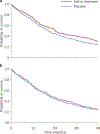Next generation oncology drug development: opportunities and challenges
- PMID: 19390552
- PMCID: PMC7079165
- DOI: 10.1038/nrclinonc.2009.38
Next generation oncology drug development: opportunities and challenges
Abstract
The optimal development of novel molecularly targeted agents for the treatment of cancer requires a re-evaluation of the current drug development paradigm. Selection of patients, optimal biologic dose versus maximum tolerated dose, definition of response and clinical benefit and trial designs that address these considerations are the focus of debate in the field of early cancer therapeutics. We present a review of the opportunities and challenges facing drug development in oncology through the phases of clinical development starting with first-in-human trials.
Figures


References
-
- Kola I & Landis J Can the pharmaceutical industry reduce attrition rates? Nat. Rev. Drug Discov. 3, 711–716 (2004). - PubMed
-
- Fox E et al. Clinical Trial Design for Target-Based Therapy. Oncologist 7, 401–409 (2002). - PubMed
-
- [No authors listed] Steps to consider in pharmacodynamic assay development http://dtp.nci.nih.gov/docs/phase0/PharmacoDynamicAssayDeveloment.html (accessed 25 september (2008).
-
- Perez-Soler R et al. Determinants of tumor response and survival with erlotinib in patients with non-small-cell lung cancer. J. Clin. Oncol. 22, 3238–3247 (2004). - PubMed
Publication types
MeSH terms
Substances
Grants and funding
LinkOut - more resources
Full Text Sources

